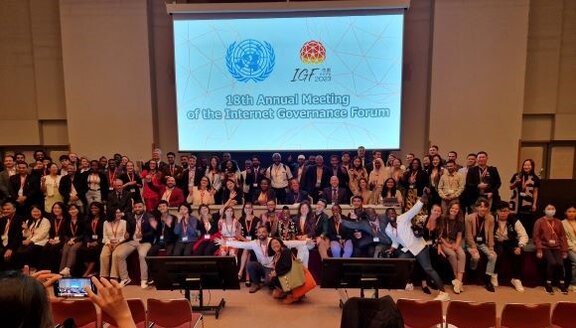With the events of day 0, the 18th Internet Govenance Forum began in Kyoto, Japan, on 8 October 2023. More than 8200 people will come together in the coming days to discuss all relevant issues of internet policy and regulation. Especially the events important for children’s rights will be reported on our homepage.
#16: Youth participation: co-creating the Insafe network
On Sunday morning, various representatives of the INSAFE network presented their national activities, each emphasising the involvement of young people in these and in developing materials. Regardless of whether the Safer Internet Centres in Belgium, Poland or the activities in the UK were reported, it became clear that the existing guidance and support services are increasingly enriched by peer-to-peer services. For this purpose, young people are empowered to provide help and advice to people of their age group. For example, the Safer Internet Centre UK runs the "Digital Leaders Programme" together with Childnet. And in Poland, young people have created a joint webinar series "talking about internet" to reach more young people through digital services and inform them about issues that are important to them. But even though young people are increasingly taking action themselves to help others with concerns and challenges, this does not replace the role of adults in the services. In Belgium, the Max programme is currently being implemented with the aim of ensuring that every young person has a trusted adult to turn to when they have unpleasant experiences in digital environments. Central to this is that young people can choose their "Max" themselves. Crucial to this approach is that research shows that young people often do not turn to their parents or educational staff to share their concerns or ask for help.
In the afternoon, the Global Youth Summit addressed digital topics of concern to young people all over the world. The young representatives from Hong Kong, India and Italy called for processes and policies to make the internet and digital applications safe for children and young people. In order for this to happen in the interest and sense of young people, it should be ensured that they are involved in the development of such policies and that their opinion is taken into account. A representative of the European Commission pointed out in this context that the European Union is committed to an approach that puts people at the centre of its policies and considers their interests rather than those of states or companies to be decisive. Adult participants also emphasised that the aim was to balance the various fundamental rights to freedom, privacy and protection. Vint Cerf also addressed these aspects at the beginning of the event. In contrast to what was heard from adults later on, however, he already anticipated his support for the concerns of the young generation by clearly stating that the freedom of each individual ends where it interferes with that of the other. With regard to the protection against attacks or violations in the digital environment, which young people called for several times in the debate, he critically noted that these unintended effects of the internet should not undermine its goal of overcoming barriers and enabling networking and exchange.
#149 Scoping Civil Society engagement in Digital Cooperation
The session addressed the engagement of civil society organizations in the Global Digital Compact (GDC) which was first mentioned in the UN Secretary General’s Roadmap for Digital Cooperation in June 2020. The Global Digital Compact’s objective is to ensure that digital technologies are used responsibly and for the benefit of all, while addressing the digital divide and fostering a safe and inclusive digital environment.
Among the issues addressed by the GDC are
- Upholding human rights
- Avoiding fragmentation
- Digital connectivity
- Promoting trust
As it turned out in the debate although children’s rights may be assumed under human rights they nonetheless do not feature as prominently in the GDC so far as one could have expected from the Roadmap.
In regard to the process to develop the GDC civil society organizations recommended transparency, an accurate reflection of the scope and coherence.
The substance of the GDC was discussed along the lines of the paper issued by the Co-facilitators of the UN SG’s Global digital Compact on Sept. 9th, 2023 based on the deep dive discussions on the GDC. Participants came to the conclusion that the paper should be the basis for on-going discussions. The IGF 2023 is a key moment for Civil Society in regard of expressing a common position towards the Gobal Digital Compact.

